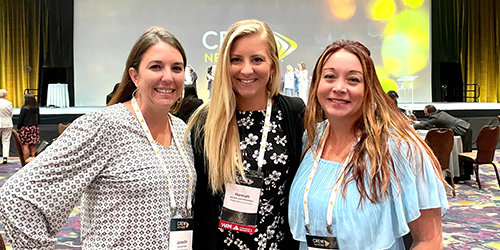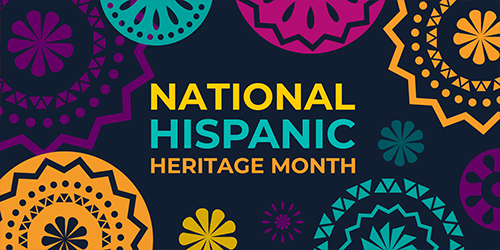Happy Latinx Heritage Month! This month is dedicated to celebrating the culture, history, and achievements Latinx people bring to the United States. A community of more than 60 million people[1], Latinx influence in the history of the United States is immeasurable. To know Latinx culture is to know vibrancy and liveliness. Latinx traditions are filled with vivid color, spirited music, and, of course, cuisine that is deeply rooted in history and flavor.
Beyond the culture, there are countless Latinx individuals who have made extraordinary contributions to America. Common household names like Cesar Chavez, Dolores Huerta, Sonia Sotomayor, and Lin-Manuel Miranda merely scratch the surface.
The theme for this year's Latinx Heritage Month is "Be Proud of Your Past, Embrace the Future". It invites Latinx people to honor their heritage and use it as a guide for the endless possibilities available to them. But it can also be a reminder to all that we can't acknowledge Latinx achievements without acknowledging their journey.
Approximately 1/3 of Latinx people in America are foreign born.[2] They are the largest immigrant population in America[3], and arguably, the most talked about. As a second-generation Mexican American and a former immigration attorney, often what I find most prevalent in conversations surrounding immigration is an absence of understanding. Understanding not only of the sacrifices immigrants make to come to America, but understanding of the vast amount of contributions—big and small—that they bring with them.
The largest populations of Latinx immigrants in America are located in California, Texas, and Florida.[4] Our shopping centers in these three states make up over 30% of the PECO portfolio. Without question, Latinx immigrants are our neighbors and our shoppers. Our Latinx neighbors operate grocery stores, restaurants, offices, and community organizations, bringing in diverse shoppers and services that might otherwise be absent in our centers. We would be remiss to not recognize their influence and their contributions to our economy and our culture.
Economic
If United States Latinx individuals were an independent country, it is estimated they would have the 8th largest GDP in the world, with the 3rd fastest growth rate.[5] Additionally, they are the fastest-growing group of entrepreneurs in the country. In the last decade, the number of Latinx entrepreneurs grew 34%, compared to only 1% for all business owners in America.[6] It is also estimated that businesses majority owned by Latinx people provide nearly 2.7 million jobs to American workers.[7]
Furthermore, Latinx households contribute over $100 billion to Social Security, $25 billion to Medicare, and possess spending power topping a trillion dollars.[8] Undocumented immigrants alone paid an estimated $31.9 billion in federal, state, and local taxes in 2018; money going toward government benefits and resources that those same individuals are not eligible to receive.[9]
Notably, most available statistics don't even account for contributions made by second-generation Americans born to immigrant parents. The overall economic contribution of Latinx immigrants and their families is incalculable.
Culture
Latinx immigrants are resilient, gracious, and family/community focused. These traits are not happenstance. They are harvested by people who followed a burning hope in their heart that America could be a new beginning for them and their family. These same traits are instilled in their family, passing down from generation to generation; slowly weaving themselves into the bedrock of American society. Jeff Bezos, the founder and CEO of Amazon, possesses the surname of his stepfather, Miguel Bezos, who helped raise Jeff from the age of 4. Miguel was an unaccompanied, Cuban-immigrant minor in the early 1960s.[10] There is no denying Jeff's contributions to the American landscape, but it is his work ethic, ingenuity, and determination that Jeff attributes to his father, Miguel. Latinx immigrants come to America looking for opportunity and hope, but I believe they themselves bring hope to America: hope that our country can continue to flourish as a land of opportunity: a place for ordinary people to do and create extraordinary things.
Often overlooked during Latinx Heritage Month is the everyday contributions of Latinx immigrants. They reside in every corner of America, occupying positions in all career fields. I urge you to take a look around; take note of all the contributions Latinx people bring to your everyday life. They are farmworkers, business owners, teachers, parents, CEOs, construction workers, politicians, doctors, athletes, attorneys, and everything else in between. Latinx immigrants make our country better, they make our communities better, and as for PECO, they make our shopping centers better.
I would challenge all of you to ask yourself: how can I honor Latinx people in my everyday life? Consider reading a book by a Latinx author, find a new restaurant or other Latinx owned business to patronize, or seek out an event in your community celebrating Latinx culture.
Our PECO MORE (Multicultural Opportunities, Resources & Education) group is continuing to identify opportunities to celebrate our Latinx Neighbors throughout the year. Stay tuned for more exciting things to come!
Sources
[1] https://www.pewresearch.org/fact-tank/2019/09/16/key-facts-about-u-s-hispanics/
[2] https://www.pewresearch.org/hispanic/fact-sheet/latinos-in-the-u-s-fact-sheet/
[3] https://www.pewresearch.org/fact-tank/2020/08/20/key-findings-about-u-s-immigrants/
[4] https://www.pewresearch.org/hispanic/fact-sheet/latinos-in-the-u-s-fact-sheet/
[5] http://www.california-mexicocenter.org/wp-content/uploads/2020/10/1.-2020_LDCLatinoGDP_final.pdf
[6] https://www.gsb.stanford.edu/sites/default/files/publication-pdf/report-slei-state-latino-entrepreneurship-2019.pdf
[7] https://blog.unidosus.org/2019/03/21/10-years-great-recession/
[8] https://www.jec.senate.gov/public/_cache/files/d25ebfa5-5843-4ce4-ac6d-a75c8af6425d/hhm2020-economicstateofthehispaniccommunityinamerica-final.pdf
[9] https://www.americanimmigrationcouncil.org/research/immigrants-in-the-united-states
[10] https://americanhistory.si.edu/family-voices/individuals/miguel-bezos
Published On Oct 15, 2020
in PECO Culture





